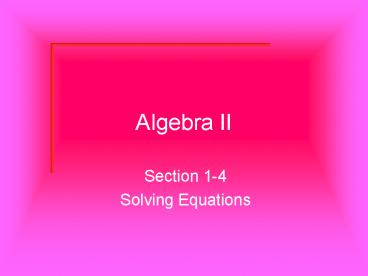Algebra II PowerPoint PPT Presentation
1 / 24
Title: Algebra II
1
Algebra II
- Section 1-4
- Solving Equations
2
What You'll LearnWhy It's Important
- To translate verbal expressions and sentences
into algebraic expressions and equations - To solve equations by using the properties of
equality, and - To solve equations for a specific variable
- You can use equations to solve problems involving
history, astronomy, and travel.
3
Word Expressions?Algebraic Expressions
- The language of today's algebra provides a
powerful way to translate word expressions into
algebraic or mathematical expressions. - Variables are used to represent numbers that
aren't known - Any letter can be used as a variable.
4
Word Expressions?Algebraic Expressions
- The language of today's algebra provides a
powerful way to translate word expressions into
algebraic or mathematical expressions. - Variables are used to represent numbers that
aren't known - Any letter can be used as a variable.
5
Example 1Fill in the boxes with other words that
mean the same thing
6
Example 1Fill in the boxes with other words that
mean the same thing
7
Equations
- Sentences with variables to be replaced,
- such as 4x 8 32 and 2x 4 gt 9 are called
open sentences - An open sentence that states that two
mathematical expressions are equal is called an
equation - Equations can be used to represent verbal
mathematical sentences
8
Equations
- Sentences with variables to be replaced,
- such as 4x 8 32 and 2x 4 gt 9 are called
open sentences - An open sentence that states that two
mathematical expressions are equal is called an
equation - Equations can be used to represent verbal
mathematical sentences
9
How to Solve an Equation
- To solve an equation, you find replacements for
the variable that make the equation true - Each of these replacements is called a solution
of the equation - We can use certain properties of equality to
solve equations or open sentences
10
Example 2
- Sometimes an equation can be solved by adding or
subtracting the same number on each side. - Solve x 54.57 78
11
Example 2 Solution
- Sometimes an equation can be solved by adding or
subtracting the same number on each side. - Solve x 54.57 78
- - 54.57 - 54.57
- x 23.43
- Check
- 23.43 54.57 ? 78
- 78 78 ?
Subtract 54.57 from each side
12
Example 3a
- Some equations may be solved by multiplying or
dividing each side by the same number - Solve 4x -12
13
Example 3a
- Some equations may be solved by multiplying or
dividing each side by the same number - Solve 4x -12
- x -3
- Check
- 4(-3) ? -12
- -12 -12 ?
Divide both sides by 4
This equation could also be solved by multiplying
each side by ¼, the reciprocal of 4.
14
Example 3b
- Solve
15
Example 3b
- Solve
- t -20
- Check
- -¾(-20)?15
- 1515?
Divide each side by -¾ which is the same as
Multiply each side by , the reciprocal of
16
Example 4
- In order to solve some equations, it may be
necessary to apply more than one property. - Solve 3(2a 25) - 2(a - 1) 78
17
Example 4
- In order to solve some equations, it may be
necessary to apply more than one property. - Solve 3(2a 25) - 2(a - 1) 78
- 6a 75 - 2a 2 78
- 4a 77 78
- -77 -77
- 4a 1
- a ¼
distributive substitution properties
commutative, distributive substitution
properties
subtraction substitution properties
division substitution properties
18
Example 4 Check
- Solve 3(2a 25) - 2(a - 1) 78
- 3(2¼ 25) - 2(¼ - 1) 78
- 3(25½) 2(-¾) ? 78
- 76½ 1½ ? 78
- 78 78 ?
19
Example 5Integration Geometry
- Sometimes you need to solve an equation or
formula for a variable. - The formula for the volume of a cylinder is V
?r2h, where V is the volume, r represents the
radius of the circular base and top and h
represents the height of the cylinder. Solve the
formula for h.
r
h
20
Example 5Integration Geometry
- The formula for the volume of a cylinder is V
?r2h, where V is the volume, r represents the
radius of the circular base and top and h
represents the height of the cylinder. Solve the
formula for h. - V ?r2h
r
Divide each side by ?r2
h
21
Problem Solving Plan
- You can use a four-step problem-solving plan to
help you solve problems - 1. Explore the problem
- 2. Plan the solution
- 3. Solve the problem
- 4. Examine the solution
22
Example 6Integration Geometry
- The perimeter of a parallelogram is 48 inches.
What is the length of the longer side if the
shorter side measures 9 inches?
l
9 in.
23
Example 6 SolutionIntegration Geometry
l
9 in.
- The perimeter of a parallelogram is 48 inches.
What is the length of the longer side if the
shorter side measures 9 inches? - Explore Draw a diagram and let l represent the
measure of the longer side - Plan The perimeter equals the sum of the lengths
of the sides. So, we can write the following
equation - 2(9) 2(l) 48
- Solve 18 2l 48
- -18 -18
- 2l 30
- l 15 The length of
the longer side is 15 inches - Examine If one of the two longer sides has
length 15 inches and one of the shorter sides has
length 9 inches, the perimeter is 15 15 9
9 48 inches. Thus, the answer is correct.
24
THE END

